QuestionI have read your bio. I agree to read and rate your response fairly within three days.
Ten days ago I got a lab and up until yesterday everything has been great. She's taken well to the crate, we've had very few accidents, I take her out every couple hours even during the day when Im at work. She's very gentle and has no problems being touched when shes calm, but when she gets playful she becomes extremely aggressive (moreso than a puppy should be I think). She bares her teeth and snaps, if she gets hold of my hand or arm she will bite hard (now almost starting to draw blood), I've tried a bunch of techniques; the 'ouch' in a high pitched voice, substituting my hand/finger for one of her toys, I've said 'NO' in a deep growly voice and then stopped playing with her, but she doesnt seem to grasp that shes taking it too far. Its a little unnerving that shes showing her teeth and snapping at the hand at this age. Does she just want to play and Im 'ignoring' it? or should i be upset that she's that aggressive? she;s only 12 pounds now so not much damage will be done but if i dont squash this now, soon i'll have a 70lbs dog thats showing her teeth and snapping everytime she gets worked up in a play frenzy.
just so you're totally aware, its only when she's in the excited state that she does this. all other times shes very happy and gentle.
If you've seen anything like this, have any ideas, maybe im overreacting, I'd like to hear from you
Thanks
Shawn
AnswerHi Shawn,
First, thanks for following the instructions in my bio after taking the time to read it.
It's good to hear that your Lab pup is coming along nicely with crate training and that you get many opportunities during the day to walk her and teach her good elimimation habits early on.
While puppy nipping is normal, it sounds to me as if you feel that what your pup is doing is tipping over in to aggression during play. To me it sounds as if she's becoming overly aroused during play, at which time she has little control or awareness of the hardness of her bite because of her age and (lack of) experience.
Puppies learn proper bite inhibition (that is, how to adjust their bite so that no one gets hurt) through play with littermates and with the mother. If your pup didn't spend the proper amount of time being allowed to play and interact with her littermates and her mother, then it could be that she didn't learn how to properly adjust her bite during play. The high-pitched "ouch" you've let me know you're using is a method which generally works with dogs who have learned that a similar high-pitched yelp from littermates indicates that biting is too hard and may end play if not quickly adjusted by the offending dog to be softer. It's generally suggested that owners use this sound because it often works with dogs who have learned that the yelp means "you're biting too hard" from their canine littermates and serves to have the offending dog soften their bite; so, a human mimicking the sound often has a similar effect on a dog. However, if it's not working, you're have reason to be concerned that a pup who's only 12 lbs. now will have a much harder and more experienced bite that could do damage when she becomes much bigger and older.
Here's what I would do, which are several things, to start. If possible, contact the breeder of your pup and see if it's possible to have her spend more time playing with littermates and the mmother in a supervised fashion if littermates haven't all been adopted out yet. Perhaps you can bring her there for a play date a few times a week. Second, have her play with well-adjusted, even-tempered and appropriate adult dogs in a secure setting under supervision. While most pups get a "puppy license" from adult dogs for their behaviour, most behaviourally well-balanced adult dogs will still tolerate only so much from a rambunctious puppy and will gently, but firmly, correct a puppy who's biting too hard or being annoying in other ways. Supervised interactions over the next months with several behaviourally well-balanced adult dogs can be very important in teaching your dog appropriate manners and appropriate bite inhibition.
You can also play a game with your pup which will teach her to treat your skin more gently. This is a critical age at which to teach your pup bite inhibition. The game is called "gentle" and here's how it's played:
Whenever you offer your dog a toy or a treat, release it to her only if she takes it gently, which you will cue by saying the word "gentle" to her. If she attempts to take the item without your permission and by 'snarfing' (grabbing) it, do not release the item to her until she uses a more gentle approach and waits for you to allow her to "take it," another cue which you will also say upon relinquishing the toy or treat to her. It's a good idea to teach a dog not to take anything in its mouth until you let the dog know that it's okay to do so, not only because it keeps the dog safe, but because it teaches the dog excellent impulse control and manners. It also keeps people safe, because your dog will have learned to wait to being cued to take a treat or toy before grabbing it, and people, even children, may offer your dog treats or toys (or, your dog may decide to take them if she hasn't been taught "take it" and "gentle" manners). In essence, by teaching your dog these crucial behaviours, you're also 'buying' yourself insurance for what will be a large dog.
Dogs generally can be made to understand the purpose of this game/exercise really well too by using treats. Hold a treat a few inches in front of her nose, and ask her to "wait" to take it before you release the treat to her. When she waits, say "yes" to let her know she's doing the right thing, and then release the treat to her with "take it." At first, don't wait very long. As she becomes better at the game/exercise, start gradually builing in more duration.
If at any time she attempts to take the treat in a rough manner, or before you let her know that it's okay to do so with "take it," do not release the treat to her. Calmly move it away, and then offer it to her again as you cue her "wait" and then to take the treat in a "gentle" manner. When she waits and attempts to take the treat gently, say "okay" and then let her have the treat as you say the words "take it" just before you give it to her. I have trained owners and their dogs, and my dogs, to be so successful at this exercise that the dogs (my own included) have learned to wait to take a treat or toy which is being held so close to them that it practically touches the dog's lips! Acquisition of such training indicates a very well trained dog, and is not difficult to accomplish if you're patient, use positive methods, work at daily and maintain the behaviour with practice a few times a week once your dog has become adept at the behaviour.
For dogs who become rough with their mouths, I think stopping play for a couple of moments is a good idea. I would continue employing this method as you've only had your pup for 10 days and over time she may make the association that 'Biting Hard' causes 'Stopping of Play and Fun.'
The last bit of advice I'll suggest is to make sure that your pup has lots of safe chew toys so that she has an outlet for chewing, which all dogs need to do. Kongs are good chew toys as they can be stuffed and frozen for longer chewing time and are safe for your dog. Rope tug toys are good to use to play with your dog interactively, with your supervision, but may not be safe to leave your dog alone with. I would suggest avoiding rawhide and would also suggest closely supervising a dog to whom you give plush/soft toys or toys with squeakers. If you're not sure about the safety of toy, you can check with the manufacturer about possible safety issues. You can also get reviews about pet products at this Web site, which is a wonderful resource for pet owners: www.petproductadvisor.com
There are trainers out there who think a dog's teeth should *never* touch human flesh. I'm not one of them <smile>. I think a dog needs to know how to treat human flesh gently and with respect in order to reduce the possibility of an "accident." That's been my professional point of view for almost a decade, and I have successfully employed this philosophy personally as well in the training of my own dogs for over 30 years.
Now is also an optimum time to get your dog same basic training which will assist you. A good trainer using positive reinforcement methods will be able to help you teach your dog to "drop it" (drop an item on cue) and "take it" (take an item on cue and only when you allow your dog to do so), and also the proper way to teach your dog to "leave it" (don't take an item at all, just leave it alone). As well, I would suggest working with a trainer to install an On/Off switch in your dog as regards your dog's arousal levels. The general idea of this on/off training is to take a dog up to a certain arousal level (the "on" switch) and then teaching and asking the dog to use her inner resources to calm down by doing something passive, such as sitting or lying down for a couple of moments (the "off" switch). This last exercise is extremely important in teaching dogs self-control and how to regulate their own arousal systems so that their behaviour doesn't become out of control.
There are several books that may help you with training your dog if you're unable to hire a trainer at this time. Go to the Dogwise link on my Web site (click "Books" on the menu choices to the left) at www.ny-njdogtrainer.com and on the Dogwise link you will find a new book by Jean Donaldson called "Train Your Dog Like a Pro" which will give you some excellent tips on training your dog the way professionals do it, but simplified for dog owners. You may find other books on the link which will help you out, as the Dogwise link is a great resource for dog owners and dog professionals alike.
You're smart to have reached out with your concerns at this early point in your pup's life. It sounds as if your pup has a dog savvy and tuned-in owner. With such a good start, I feel she'll do very well with your consistency, concern and patience. Realize that your dog is still a pup and that it can take a good year of ongoing, patient, consistent training, or more, to have a behaviourally healthy dog for life. The time put in during the first year is well worth it.
Again, thank you for taking the time to read my bio and agreeing to the virtual contract therein - much appreciated. Best of luck with your new pup, and I hope a couple of months down the road you can send me an update and let me know how it's been going.
Best regards,
Madeline, a NY-NJ Dog Trainer (tm) and Volunteer at AllExperts

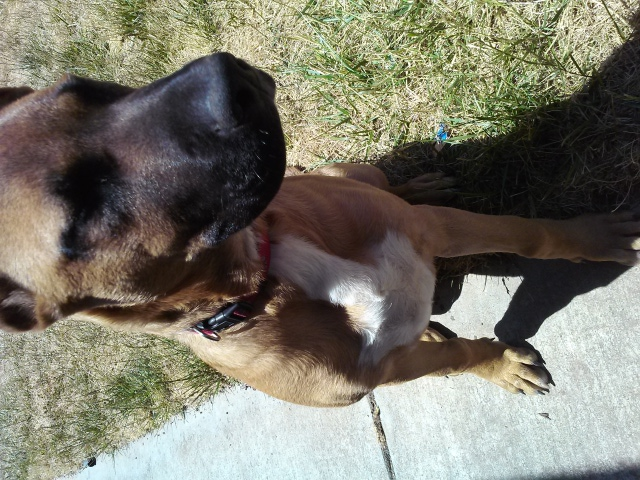 dog breed unknown
Question
dog breed unknown dog breed unknown &nbs
dog breed unknown
Question
dog breed unknown dog breed unknown &nbs
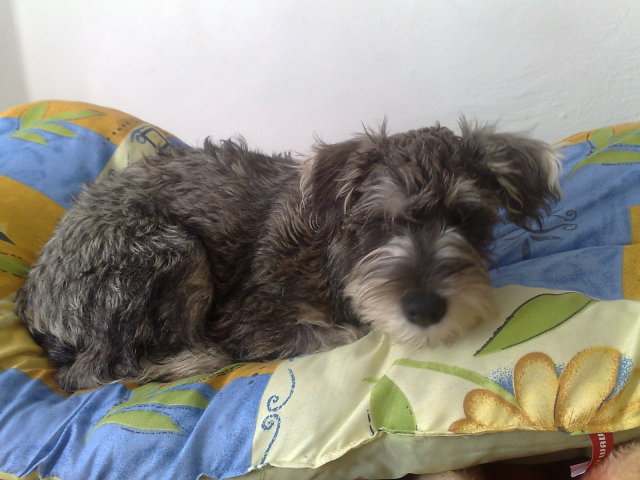 Anxiety separation????
Question
donovan
HI then, I got my schnauzer when it w
Anxiety separation????
Question
donovan
HI then, I got my schnauzer when it w
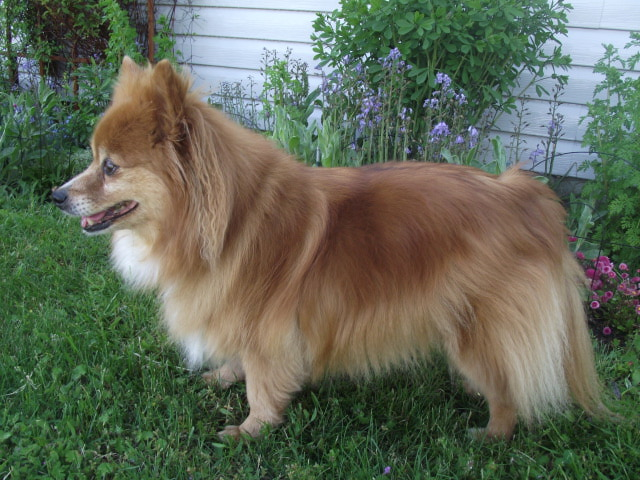 Shaving a Pomeranian
Question
Brandy my Pomeranian!
I have a few ques
Shaving a Pomeranian
Question
Brandy my Pomeranian!
I have a few ques
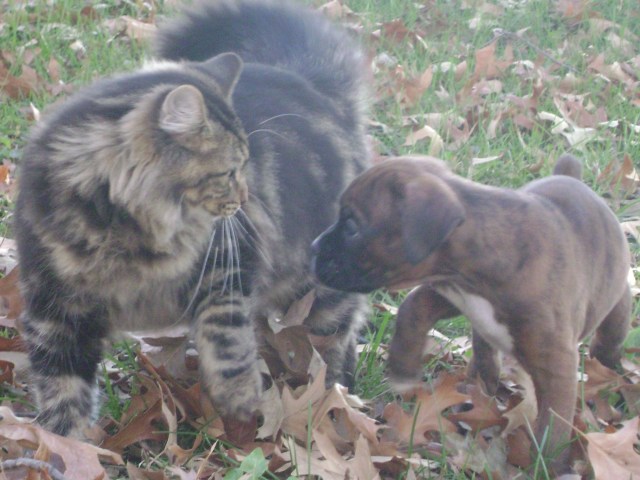 Puppy wont come!
QuestionCapone & Rascal
QUESTION: Help! &nbs
Puppy wont come!
QuestionCapone & Rascal
QUESTION: Help! &nbs
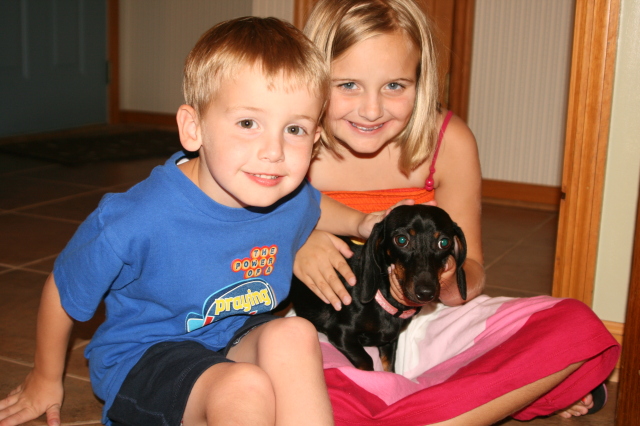 1 year old daschund
Question
our new member
We recently got a one year old
1 year old daschund
Question
our new member
We recently got a one year old